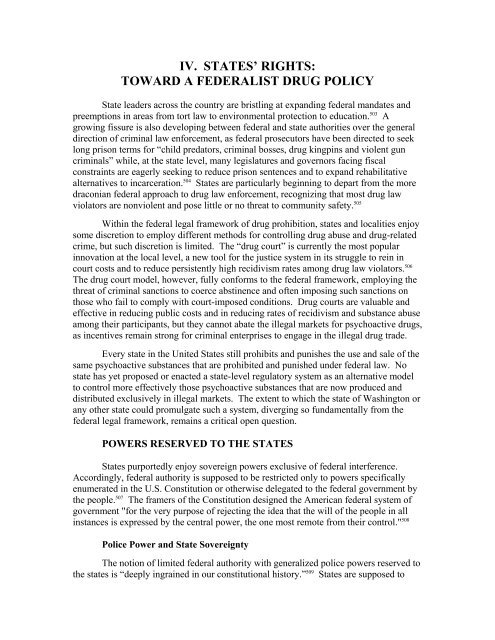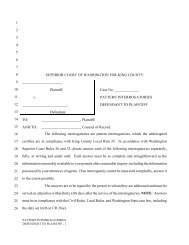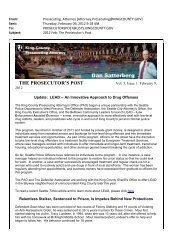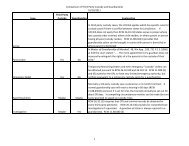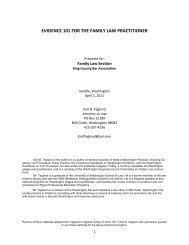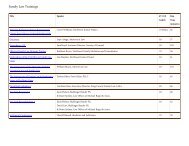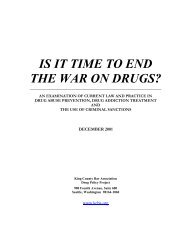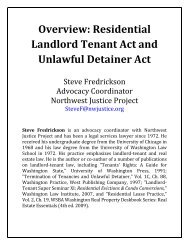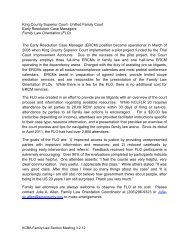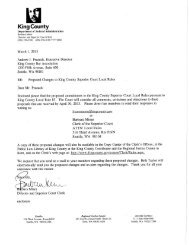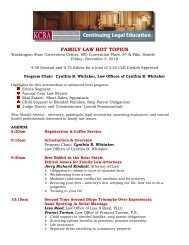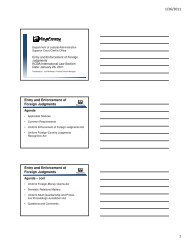Effective Drug Control: Toward A New Legal Framework
Effective Drug Control: Toward A New Legal Framework
Effective Drug Control: Toward A New Legal Framework
You also want an ePaper? Increase the reach of your titles
YUMPU automatically turns print PDFs into web optimized ePapers that Google loves.
IV. STATES’ RIGHTS:<br />
TOWARD A FEDERALIST DRUG POLICY<br />
State leaders across the country are bristling at expanding federal mandates and<br />
preemptions in areas from tort law to environmental protection to education. 503 A<br />
growing fissure is also developing between federal and state authorities over the general<br />
direction of criminal law enforcement, as federal prosecutors have been directed to seek<br />
long prison terms for “child predators, criminal bosses, drug kingpins and violent gun<br />
criminals” while, at the state level, many legislatures and governors facing fiscal<br />
constraints are eagerly seeking to reduce prison sentences and to expand rehabilitative<br />
alternatives to incarceration. 504 States are particularly beginning to depart from the more<br />
draconian federal approach to drug law enforcement, recognizing that most drug law<br />
violators are nonviolent and pose little or no threat to community safety. 505<br />
Within the federal legal framework of drug prohibition, states and localities enjoy<br />
some discretion to employ different methods for controlling drug abuse and drug-related<br />
crime, but such discretion is limited. The “drug court” is currently the most popular<br />
innovation at the local level, a new tool for the justice system in its struggle to rein in<br />
court costs and to reduce persistently high recidivism rates among drug law violators. 506<br />
The drug court model, however, fully conforms to the federal framework, employing the<br />
threat of criminal sanctions to coerce abstinence and often imposing such sanctions on<br />
those who fail to comply with court-imposed conditions. <strong>Drug</strong> courts are valuable and<br />
effective in reducing public costs and in reducing rates of recidivism and substance abuse<br />
among their participants, but they cannot abate the illegal markets for psychoactive drugs,<br />
as incentives remain strong for criminal enterprises to engage in the illegal drug trade.<br />
Every state in the United States still prohibits and punishes the use and sale of the<br />
same psychoactive substances that are prohibited and punished under federal law. No<br />
state has yet proposed or enacted a state-level regulatory system as an alternative model<br />
to control more effectively those psychoactive substances that are now produced and<br />
distributed exclusively in illegal markets. The extent to which the state of Washington or<br />
any other state could promulgate such a system, diverging so fundamentally from the<br />
federal legal framework, remains a critical open question.<br />
POWERS RESERVED TO THE STATES<br />
States purportedly enjoy sovereign powers exclusive of federal interference.<br />
Accordingly, federal authority is supposed to be restricted only to powers specifically<br />
enumerated in the U.S. Constitution or otherwise delegated to the federal government by<br />
the people. 507 The framers of the Constitution designed the American federal system of<br />
government "for the very purpose of rejecting the idea that the will of the people in all<br />
instances is expressed by the central power, the one most remote from their control." 508<br />
Police Power and State Sovereignty<br />
The notion of limited federal authority with generalized police powers reserved to<br />
the states is “deeply ingrained in our constitutional history.” 509 States are supposed to


